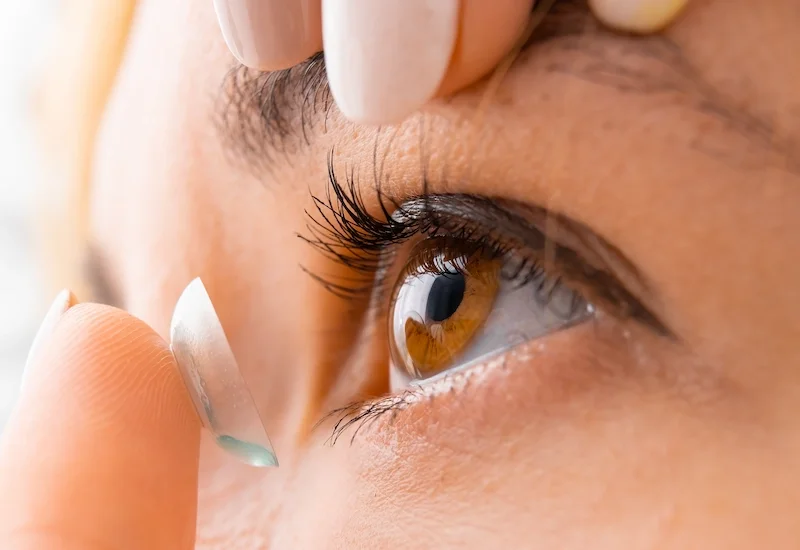Common Misconceptions about Contact Lenses

Are you interested in trying contact lenses? Chances are you’ve heard some information about the perks or risks of wearing contacts. How much of this information is fact, and how much is fiction? It’s time to debunk the myths and uncover the truth about contacts. Here are some common misconceptions surrounding contact lenses.
Contact Lenses Get Stuck Behind Your Eye
False. It is physically impossible for a contact lens to become lodged behind the eyeball. There is a thin membrane that is attached to the eyelid, and this prevents a contact lens from traveling behind the eyeball.
Contact Lenses Are Uncomfortable
False. This myth may have been based on the design of how contacts used to be made. Just like many modern eyewear developments, contact lens technology has come a long way over many years. Contact lenses were invented nearly 200 years ago, so the materials, design, and comfort level are very different now.
Contact Lenses are Too Much Trouble
False. Caring for contact lenses couldn’t be easier. Daily disposables are one-use lenses that can be disposed of after a single day’s use, so care is irrelevant. Reusable contact lenses have a straightforward cleaning process. They are stored between uses in a case filled with cleaning solution until expiration.
I’m Too Old to Wear Contact Lenses
False. In fact, some people don’t need glasses or contacts until they are in their 40s, 50s, or 60s, and they choose to wear contacts instead of readers. There is no age limit on contact lenses.
I’m Too Young to Wear Contact Lenses
Mostly False. There is no age restriction when it comes to contact lenses. Obviously, maturity and responsibility come into the picture. Individuals can wear contact lenses when they are responsible for their eye care.
Contact Lenses Are Too Challenging to Put In My Eye
False. When you order your contact lenses, the staff at your eye doctor will teach you how to put them in and take them out.
Contact Lenses Will Get Stuck in My Eye
It is extremely rare that contact lenses become stuck to the eye. If the eye begins to feel dry behind the contact lens, applying some drops should solve the problem.
People Who have Astigmatism Can’t Wear Contact Lenses
Specialized lenses called Toric lenses are used for people with astigmatism. With astigmatism, the lens and cornea aren’t perfectly shaped. This can cause blurry vision, and Toric lenses are very effective in correcting this issue.
Contact Lenses Fall Out Easily
Contact lenses are made so they can’t easily fall out of the eye. Contacts can move around the eye a little but can be moved back into place if the wearer blinks a few times and gently pushes them back into the right spot.
Contact Lenses are Too Expensive
Contact lenses are usually comparable to glasses in price. They can be quite affordable depending on the brand and how frequently you wear them. Ask your optometrist’s office staff to recommend the type of contact lenses that best suit you and your lifestyle.
Conclusion
Contact lenses can be a very effective way to correct vision issues. Many individuals find them quite comfortable and more convenient than regular eyeglasses. For more information, ask your vision associates for assistance.
Spindel Eye Associates
When you’re ready to try contact lenses, contact Spindel Eye Associates. Whether you seek an optometrist or an ophthalmologist, we will treat your eyes with precision and care. With four locations in the New Hampshire area, we are available to see patients in Derry, Londonderry, Windham, and Raymond. For more information, visit our website or call (603) 217-2583.
RECENT POSTS
categories
- Uncategorized
- Eye Exams
- Lasik
- Spindel Eye Reviews
- Cataracts
- Dry Eyes
- Refractive Errors
- Infographic
- Glaucoma
- Macular Degeneration
- Ocular Diseases
- Pulsed Light Therapy
- IPL
- eye care
- eye health
- Eye irritation
- Eye Syndrome
- Eye Doctors
- Diabetes
- Contacts
- LASIK Surgery
- dry eye syndrome Manchester
- Glasses
- Vision Care
- LipiFlow
- Contact Lenses
- Astigmatism
- Crizal Prevencia
- Spindel Eye
- Children
- skin cancer
- Sunglasses
- Eye Disease
